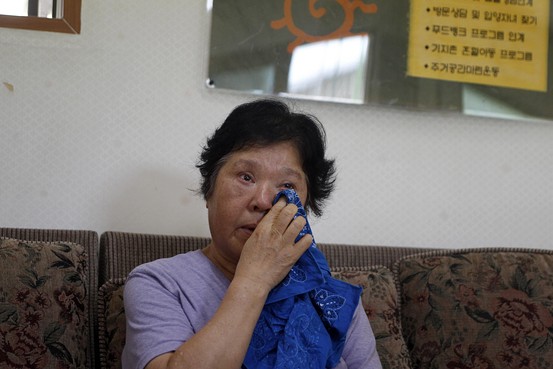Photo courtesy of Reuters
by STEVE HAN
In South Korea, much light has been shed upon the plight of the Korean “comfort women,” who were forced into sexual slavery by Imperial Japan during World War II. The survivors, who number about 50 today, receive government assistance under a special law, as the Korean government continues to pressure Japan to compensate and apologize to the victims.
Such efforts seem to contrast sharply with the situation of the Korean “camptown women,” the group of elderly women who used to work as prostitutes for American soldiers in the 1960s. Though the prostitution at the time was government-sanctioned, during an era of dictatorship and as Korea was suffering from great post-war poverty, these women became social pariahs in their own country. They were essentially confined to living out their lives in squalid conditions in tiny homes in the camptowns near U.S. Army garrisons.
But now, even that small comfort may be taken away. More than 70 elderly camptown women in the Anjeong-ri neighborhood of Pyeongtaek, near Camp Humphreys, are being threatened with eviction, according to the Associated Press. Because of a planned major expansion of the U.S. Army garrison in Pyeongtaek, to take place by 2016, landlords and developers in the area are anxious to build and make profits from the rising property values. As a result, they are sending out eviction orders to the camptown women living in the neighborhood, and are quadrupling monthly rental rates, according to Woo Soon-duk, director of the Sunlit Sisters’ Center, a local non-governmental organization dedicated to the women, as reported by AP.
“My landlord wants me to leave, but my legs hurt, I can’t walk, and South Korean real estate is too expensive,” Cho Myung-ja, a 75-year-old former prostitute, told the Associated Press. “I feel like I’m suffocating.”
In the post-Korean War period, the South Korean government saw the “service” these women provided as necessary for the thousands of U.S. soldiers stationed in the country, according to activists assisting the women. In 1962, the government designated such camptowns “special tourism districts” where prostitution was legal. The same year about 20,000 women were registered as prostitutes in about 100 camptowns throughout the country, said the AP story. Many stayed in these camptowns well into their senior years because they simply had nowhere to go.
Many of the women are stricken with disease, poverty and social stigma, and they depend upon a monthly government stipend of about $300 to $400, making their pending eviction all the more dire. Impoverished and sick, Cho told the Associated Press that she has rarely left her tiny home in Anjeong-ri because of leg pain. Another camptown woman told AP she can’t sleep after her landlord gave her a month to leave.
Activists and lawyers, who helped the women sue the South Korean government in June for compensation, say that the South Korean government and U.S. military officials used to regularly inspect the camptown operations. They say that the police kept the women from leaving at the time and would even lock them up if they were diagnosed with a sexually transmitted disease, said the AP story. And now these women want their government to take some responsibility for their welfare.
A Korean government spokesperson declined AP’s request for comment, pending a court decision on the case. The news agency also reported that U.S. military officials said in a statement that they were aware of the camptown women’s case, but had “zero tolerance” for prostitution.







